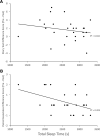Does Napping Enhance the Consolidation of Clinically Relevant Information? A Comparison of Individuals with Low and Elevated Depressive Symptoms
- PMID: 33603524
- PMCID: PMC7882434
- DOI: 10.2147/NSS.S297872
Does Napping Enhance the Consolidation of Clinically Relevant Information? A Comparison of Individuals with Low and Elevated Depressive Symptoms
Abstract
Purpose: Sleep, both overnight and daytime naps, can facilitate the consolidation of declarative memories in healthy humans. However, it is unclear whether such beneficial effects of sleep occur in special populations, such as individuals with elevated neuropsychiatric symptoms, and if they apply to clinically relevant material that may have personal significance to those populations.
Methods: We examined memory retention over a 60-minute interval of wakefulness or nap opportunity in participants with low or elevated scores (≤13 and ≥21, respectively) on the Beck Depression Inventory-II (BDI-II). Memory for depression-related information was assessed by (a) free-recall of a video depicting a personal experience narrative of the impact of depression on cognition and workplace performance; and (b) a paired-associates task linking depression-related cognitive symptoms to appropriate coping strategies.
Results: The results showed no overall difference in recall between the nap and waking condition. However, across the full sample of participants, there were significant positive correlations between total sleep time and paired associates recall, and slow wave sleep (SWS) percentage and story free recall performance. Unexpectedly, participants with elevated BDI-II scores exhibited better free-recall performance compared to those with low scores.
Conclusion: These results suggest that sleep, specifically SWS, may stabilize memories for clinically relevant information in populations with low and elevated depressive symptoms. The superior recall in participants with elevated-BDI scores may be related to the personal significance and stronger encoding of depression-related information. These observations raise the possibility that mnemonic deficits in depressed patients may be, at least in part, related to the type of information used to assess memory performance.
Keywords: consolidation; depression; memory; napping; sleep; slow-wave sleep.
© 2021 Lo et al.
Conflict of interest statement
Dr Christopher R Bowie reports grants from Takeda; personal fees from Lundbeck, Pfizer, and Boehringer Ingelheim, outside the submitted work. The authors report no other conflicts of interest in this work.
Figures



References
-
- King BR, Hoedlmoser K, Hirschauer F, Dolfen N, Albouy G. Sleeping on the motor engram: the multifaceted nature of sleep-related motor memory consolidation. Neurosci Biobehav Rev. 2017;80:1–22. - PubMed
-
- Klinzing JG, Niethard N, Born J. Mechanisms of systems memory consolidation during sleep. Nat Neurosci. 2019;22:1598–1610. - PubMed
LinkOut - more resources
Full Text Sources
Other Literature Sources
Research Materials

